5 Stellar Debut Short Story Collections by Indie Authors
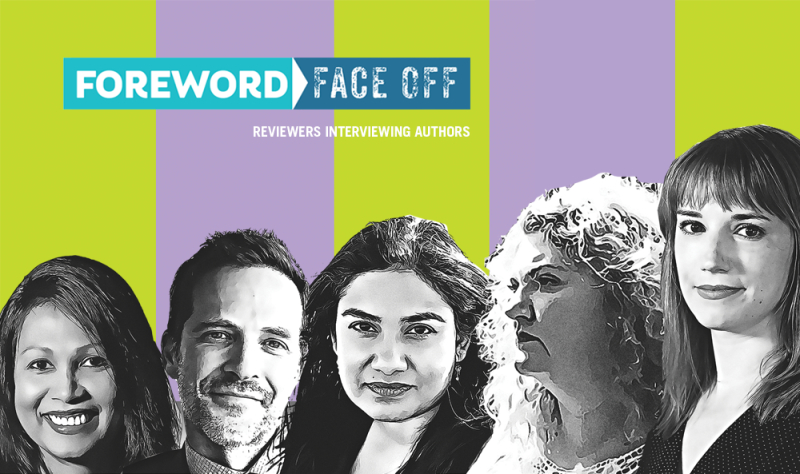
Mama never said there’d be debuts like this.
We see lots of books in these offices—indie publishers and authors send us more than ten thousand a year seeking a review—and we’ll admit that we have some particular quirks about the types of books that get us excited. Okay, here’s the deal: Debuts do it to us. We cannot lie.
So you can imagine our giddiness in putting together the Debut Fiction special interest publication we just featured in our November-December issue of Foreword—reviews of twenty-two fantastic, independently-published books from first-time authors.
In her Editor’s Note introducing the special section, Managing Editor Michelle Anne Schingler writes about the arduous toil and anxiety known to new authors. “Debut novels are firsts with long pasts. They are the product of incredible amounts of behind-the-scenes work, from the first glimmer of an idea through to drafts (and more drafts, and drafts further still), agents, submissions … and so much waiting. It can take years. Decades, even.”
To better grasp the first-novel mindset, we asked the newly launched virtuosos to write a paragraph or two about the process of completing their first book. It makes for some fascinating reading, so we thought we’d share some of their stories in the next couple installments of Foreword This Week. We also included a snippet of the Foreword review, as well as a link to the full review as it appeared in the special section.
For you wannabe novelists out there, this is must-read stuff.
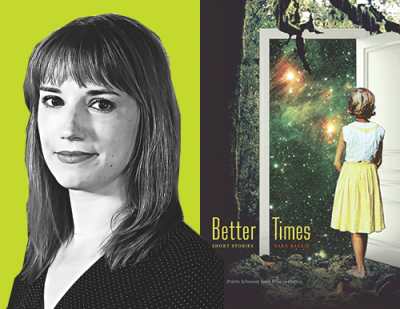
Sara Batkie
Better Times, University of Nebraska Press
Excerpt of Review by Letitia Montgomery-Rodgers: “Like a painter executing a landscape study, Batkie creates atmospheres, layering emotional textures and moods upon one another from story to story. Each is “just one part of a silence so full and complete it was as if it was waiting to be heard.” The stories dip into everyday lives, from a Japanese family during World War II to a woman trying to get rid of her ghost breast to half of a polar village that wakes up to discover that they’re adrift. These characters are besieged. Distance and alienation are a prevailing theme.”
Sara explains how Better Times came about.
“There comes a time in every short story writer’s life when they have to have a reckoning with ‘the folder.’ By that I mean the place on their laptop where they’ve saved all the stories, some published but others not, that they hope will someday become a book. Mine came in early 2017, after about nine years of writing seriously. I had published in six journals of varying prestige and pay rate, while simultaneously working my way through a novel I couldn’t get an agent to represent. Feeling frustrated by the gatekeeper process, I threw myself into the project of putting together a collection instead. To my surprise and delight there was a great joy in going through my years of work, figuring out what still worked and what didn’t, recognizing as I read what themes and subjects recurred. After a few months, I had a book: Better Times. Having been told for years in seminars and workshops that collections were difficult to sell, I decided the best thing to do was take matters into my own hands and enter Better Times in contests where the prize included book publication. I was lucky enough to win one, the Prairie Schooner Prize. It’s not necessarily how I imagined success would look like when I was younger, or even in grad school. But I’m confident it will find the readers who will treasure it, and that’s, at the end of the day, why we do it.”
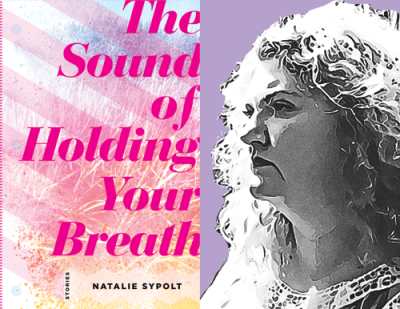
Natalie Sypolt
The Sound of Holding Your Breath, West Virginia University Press
Excerpt of Review by Letitia Montgomery-Rodgers: “The collection captures a particular Appalachian experience—predominantly that of rural white working-class men and women who are growing up, making up, or breaking up. Relationships vacillate between collisions and collusions, reinforced by the pattern of daily life: replacing the trailer’s wallpaper every spring when the old starts to peel, singing over CB call signs while dirt-road drinking and driving, assembling the congregation of a community both in and out of church, and navigating the essential, inescapable configurations of family.”
Natalie reminisces about hearing the good news from West Virginia University Press.
“When I found out that my book was going to be published, I was pushing a cart through the frozen food section of Walmart. Very glamorous, I know. My phone was in my back pocket, and when I felt the familiar notification buzz, I somehow knew it was my editor, Abby Freeland, letting me know if the Board at West Virginia University Press had approved or rejected my book. Abby had been comforting and confident that the news from the Board would be good, but I couldn’t relax until I got the official “Congratulations!” email. I nearly cried, standing there next to the Lean Cuisines. This was not how I’d imagined finding out the news that my first book was going to become a reality, but it somehow seemed perfect, nonetheless.
I told my mom almost immediately, as well as one of my best friends who had been with me through the whole process, but that was it for several weeks. I don’t know why I held on to the good news for so long. I suppose part of me was afraid that it wasn’t quite real–that something would fall through–and that if I told everyone, I’d be doubly devastated when the contracts didn’t come (I’m Appalachian–I’m always waiting for the other shoe to drop). I think I also maybe wanted to just keep it for myself for a little while, just to savor and not have to talk about or explain. This was also a difficult time for me and my family as we had just lost my grandmother a couple weeks before. She’d been my companion for most of my life, and certainly one of the first people who ever heard any news–good or bad–that I might have. Those first days after I found out my book was going to be published were a mixture of elation, and anxiety, and sadness.
But then the contract came and I signed my name. I started cleaning out the drawers in my grandmother’s bedroom, and also texted two of my best friends to tell them about the book, so that we could talk about this good thing while I was doing one of the hardest things of my life. In between sobbing and folding my grandmother’s shirts into a bag to take to Goodwill, Jill would send me a message about being “famous” now and I’d laugh because who ever got famous from a book of short stories?
In every way, my grandmother is part of this book. So is my grandfather, my parents, my friends and pets and students and my home and my county, my state, my region. Even my Walmart. I could not be prouder of the beautiful, final product, and am so excited to see it going out into the world.“

Jeremy T. Wilson
Adult Teeth, Tortoise Books
Excerpt of Review by Jeff Fleischer: “The characters in Jeremy T. Wilson’s excellent short story collection are all facing significant life changes, and the outcomes are consistently surprising, entertaining, and revealing. [They] rarely find their situations resolved, but their circumstances are always interesting. Adult Teeth is a rare collection.”
Jeremy laments the demons of doubt and disbelief.
“When I got the news that my short story collection was going to be published, it came without much fanfare: ‘We’d love to work with you to publish this,’ the email said. Where was the exclamation point? A champagne emoji? This relatively muted response probably contributed to my perpetual fear that the collection would not actually be published, and that “working with me” meant that I’d spend long hours refreshing my email only to be met with grim silence, and the whole thing would implode. Other than my wife, I didn’t tell anyone the news. I didn’t want to have to walk away from my announcement in shame like a broken engagement. After its acceptance, the book was assigned an editor, and we shared our thoughts on word choice and punctuation over the course of several months, taking each story one by one, and while I was gladly not left to fumble through these pages on my own, I quietly continued to let my fear bubble and froth. As the work progressed, and we got deeper into the process, I reached out to a few authors to politely ask for blurbs. When I got those back, authors I admired actually writing about my work, it started to feel, like, maybe this could possibly happen? Then I asked a friend of mine—a graphic designer in Atlanta—if he’d be willing to design a cover, and when I saw those initial designs, I saw the book that might sit on a shelf someday. I mean, if everything went smoothly. It still didn’t exist yet, but we were getting closer. Another friend recommended a publicist, and that was like learning that Wilford Brimley was only fifty-one years old in the movie Cocoon which is to say, eye opening. And as more and more people got involved in the process, the truth of that initial response became so obvious. ‘We would love to work with you to publish this.’ Yes! Publishing requires people, people working with me, and me working with people. Sure, there would be no collection without the stories, but there would be no book without this collection of people. Now when I hold a copy, I see the work of all the wonderful collaborators who helped make this book real. No more fear! Well… except for the fear of bad reviews.”
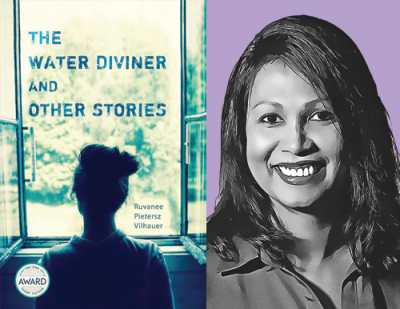
Ruvanee Pietersz Vilhauer
The Water Diviner and Other Stories, University of Iowa Press
Excerpt of Starred Review by Letitia Montgomery-Rodgers: “The Water Diviner and Other Stories investigates many aspects of Sri Lankan culture, including the long-term effects of colonialism, ethnic and religious differences, caste and class systems, colorism, racism, immigration, and more. A deep humanity drives each story, with the quest for answers always undertaken by inhabiting another’s skin. Full of richly drawn characters and empathetic inquiry, these stories capture the multiplicity of human experiences and examine collective sociocultural issues from the bottom up.“
Ruvanee shares how the immigrant experience inspires her.
When I started writing these stories, I didn’t expect them to end up in a collection. I wrote the stories over the course of many years. The first story I wrote about the immigrant experience was about a young woman who goes to college in the U.S. and experiences culture shock so profound that she begins to doubt her sanity. That story isn’t in this collection, but the second story I wrote is: a story about a Sri Lankan housemaid who ends up in the U.S. after marrying an American professor. Writing these two stories with such different protagonists made me want to explore the immigrant experience from a variety of other perspectives. Coming up with ideas for characters was effortless—they presented themselves—but finding time to write the characters’ stories was a balancing act because I had (and still have) a full-time job which I also value. The best part of writing these stories was becoming immersed in the characters’ worlds and viewpoints—their struggles to belong and connect, the complicated intimacy of their relationships, and the ways in which the past tugs at them. I think writing the stories made me more empathic, and I hope that readers will feel that same empathy towards the characters.
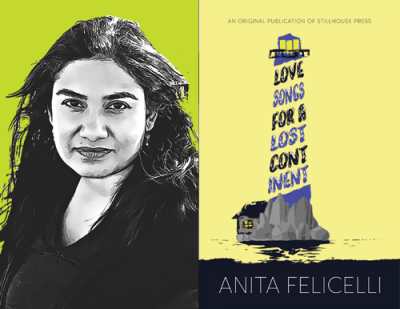
Anita Felicelli
Love Songs for a Lost Continent, Stillhouse Press
Excerpt of Starred Review by Letitia Montgomery-Rodgers: “Love Songs for a Lost Continent revels in the murky in-between spaces where the monstrous intersects with the benign and something essential is revealed. Across the collection, love and pain, displacement and connection, personal identity and culture are reconfigured until even the most prosaic home becomes lethally wistful. Recurring ties between parents, children, and places invoke questions about heritage and inheritance—cultural, mental, and physical. Felicelli plays with the personal and cultural tensions that exist between being a part of and apart from.“
Anita chats about finch hauntings and fiddling with stories from college.
“I began one of the short stories in my short story collection, “Wild Things,” while I was a college student in the late Beat poet and novelist Ron Loewinsohn’s graduate fiction writing class. Ron was a kind professor, encouraging in the face of dark, upsetting turns in my fiction, and tolerant of my then-minimalist, barebones style. In 2014, I noticed an announcement he’d passed away and remembered workshopping this old story. I found the Word file, and reread it. I was still haunted by the image of a woman breaking into an apartment and opening the window to release a cage full of zebra finches (I’d been an upstairs neighbor who owned zebra finches during college). I began fiddling around with the story. I noticed that it fit with more recent short stories I’d been writing, which were also stories full of transgression, about people who try to free themselves from other people’s stories or their own. Later, I added “Wild Things” to the manuscript of Love Songs for a Lost Continent. Including the story helped me to more consciously shape the other stories towards this theme.”
Matt Sutherland
